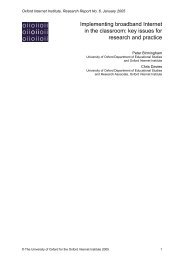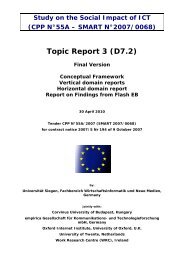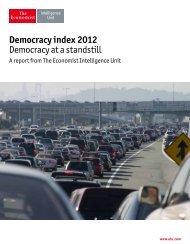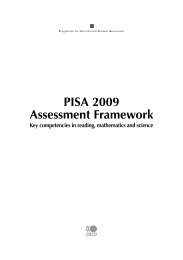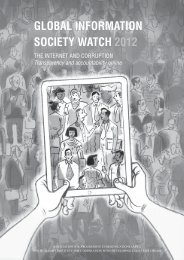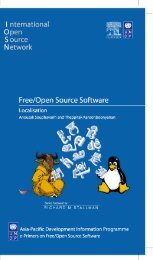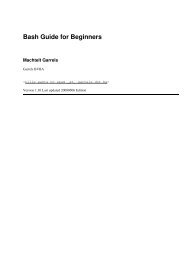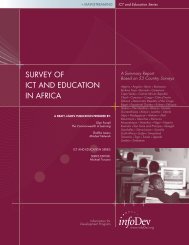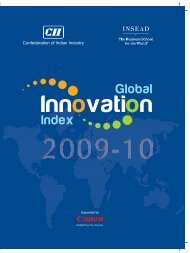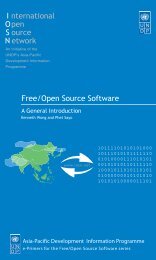Legal Aspects of the Information Society. - Free Technology Academy
Legal Aspects of the Information Society. - Free Technology Academy
Legal Aspects of the Information Society. - Free Technology Academy
You also want an ePaper? Increase the reach of your titles
YUMPU automatically turns print PDFs into web optimized ePapers that Google loves.
GNUFDL • 23 Intellectual property: authors' rights and copyright<br />
Exclusive exploitation rights are those recognised by law to <strong>the</strong>ir owner and<br />
grant an exclusive power to exercise or authorise (and, accordingly, to prohibit)<br />
beforehand certain forms or acts <strong>of</strong> exploitation with respect to <strong>the</strong>ir work.<br />
Acts <strong>of</strong> exploitation include, without limitation, reproduction (copy), distribution,<br />
public communication and transformation.<br />
EU Computer Programs Directive, Article 4<br />
Subject to <strong>the</strong> provisions <strong>of</strong> Articles 5 and 6, <strong>the</strong> exclusive rights <strong>of</strong> <strong>the</strong> rightholder within<br />
<strong>the</strong> meaning <strong>of</strong> Article 2, shall include <strong>the</strong> right to do or to authorise:<br />
(a) The permanent or temporary reproduction <strong>of</strong> a computer program by any means and<br />
in any form, in part or in whole. Ins<strong>of</strong>ar as loading, displaying, running, transmission<br />
or storage <strong>of</strong> <strong>the</strong> computer program necessitate such reproduction, such acts shall be<br />
subject to authorisation by <strong>the</strong> rightholder.<br />
(b) The translation, adaptation, arrangement and any o<strong>the</strong>r alteration <strong>of</strong> a computer<br />
program and <strong>the</strong> reproduction <strong>of</strong> <strong>the</strong> results <strong>the</strong>re<strong>of</strong>, without prejudice to <strong>the</strong> rights <strong>of</strong><br />
<strong>the</strong> person who alters <strong>the</strong> program.<br />
(c) Any form <strong>of</strong> distribution to <strong>the</strong> public, including <strong>the</strong> rental, <strong>of</strong> <strong>the</strong> original computer<br />
program or <strong>of</strong> copies <strong>the</strong>re<strong>of</strong>.<br />
As may be seen, <strong>the</strong> exploitation rights <strong>of</strong> <strong>the</strong> author <strong>of</strong> a computer program<br />
are basically <strong>the</strong> same as those for any o<strong>the</strong>r work, although <strong>the</strong>y must be<br />
adapted to its own characteristics.<br />
4.2.1. Reproduction right<br />
Reproduction consists <strong>of</strong> incorporating a work or any part <strong>the</strong>re<strong>of</strong> on a medium<br />
allowing for its communication and obtaining fur<strong>the</strong>r copies, directly or<br />
indirectly, provisionally or permanently, by any means or in any form. Even<br />
short-lived copies are considered reproductions.<br />
Supplementary content<br />
Note that <strong>the</strong> EUCPD does not<br />
apply <strong>the</strong> public communication<br />
right (e.g. transmissions<br />
in digital format via <strong>the</strong> web)<br />
to s<strong>of</strong>tware, however it is generally<br />
understood (ei<strong>the</strong>r by<br />
doctrine or case law) that s<strong>of</strong>tware<br />
is subject to this exclusive<br />
right.<br />
EUCD, Article 2. Reproduction right<br />
Member States shall provide for <strong>the</strong> exclusive right to authorise or prohibit direct or<br />
indirect, temporary or permanent reproduction by any means and in any form, in whole<br />
or in part...<br />
Acts requiring authorisation<br />
In principle, <strong>the</strong> following acts require authorisation, as <strong>the</strong>y constitute reproductions:<br />
• Downloading from <strong>the</strong> net and storage to a local hard drive or flash card.<br />
• Making copies on CDs, DVDs, or flash memory (subject to <strong>the</strong> right to make private<br />
copies or fair use).<br />
• Transmission: <strong>the</strong> delivery to ano<strong>the</strong>r system by telecommunication, local network,<br />
etc. or uploading <strong>of</strong> files onto a web server, or <strong>the</strong>ir download to a local computer<br />
(for instance, P2P transfers) or attaching a file to an email and sending it.<br />
• Loading a program to execute it: introducing <strong>the</strong> program into <strong>the</strong> RAM.<br />
• Presentation: on-screen visualisation <strong>of</strong> <strong>the</strong> graphic interface.<br />
• The integration or incorporation <strong>of</strong> <strong>the</strong> code lines <strong>of</strong> a third party in a new development.




